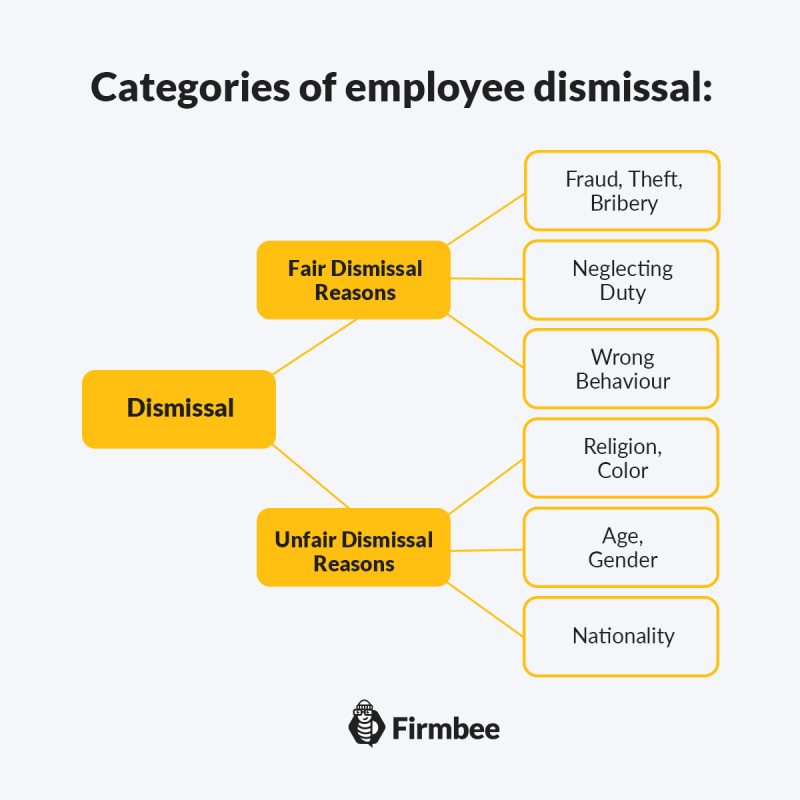In the labor market, unfortunately, there are situations in which entrepreneurs overstep their authority and make unjustified or illegal dismissals. The legal basis for dismissal is provided by statutory and precedent (in some countries) labor law. Unjustified dismissal can be grounds for an employee to appeal to a court or employment tribunal. Unjust dismissal is undoubtedly a difficult experience for employees. For some, it is tantamount to the end of their careers, and it can be extremely difficult to return to the labor market. That’s why it’s so important to take up the fight against an abusive employer.
How to handle unjustified dismissal? – table of contents:
Disciplinary dismissal
Labor laws regulate various forms of termination of employment, such as dismissal by mutual agreement. However, when we talk about wrongful termination of employment, we mean disciplinary dismissal. The reasons for disciplinary dismissal are strictly defined by legal acts.
The employer may terminate the employment contract by disciplinary action due to a serious violation of the employee’s basic duties (e.g., unexcused absence from work, an unjustified departure from the workplace resulting in, for example, a machine breakdown), the commission of a crime by the employee in connection with work (theft, beating a co-worker), as well as a loss of eligibility through the fault of the employee for the work performed (a professional driver loses license for causing an accident under the influence of alcohol).

Unjustified dismissal
We should consider dismissal unfounded if:
- The employer cannot provide evidence and irrefutable arguments proving the employee’s guilt.
- The employer failed to follow proper procedure, i.e.: the employer did not inform the employee of the charges against him, did not give him an opportunity to give an explanation, did not give him a chance to correct or improve his behavior (except in serious cases of violation of discipline), deprived him of the right to appeal the dismissal.
- Constructive dismissal occurred. This refers to a situation when an employee resigns because the employer fundamentally violated the terms of the contract.
- Shortening of the notice period or failure to observe the proper form of notice.
- Violation of provisions relating to employees with special protection against termination.
The Labor Law stipulates that in a situation of unjustified dismissal, the body considering the appeal should seek answers to two fundamental questions:
- Were there serious, legitimate as well as specific reasons determining the need for disciplinary dismissal?
- Did the employer act reasonably under the circumstances?
In summary, if the disciplinary dismissal is not supported by the reasons listed above, or the employee does not agree with the reason for dismissal, we can consider the termination of cooperation as unjustified. In such a case, the employee may assert rights before a court or employment tribunal.
What can an unfairly dismissed employee claim
Disciplinary dismissal is associated with unpleasant consequences for the dismissed person, such as:
- the disciplinary mode of termination will be included in the certificate of employment,
- the cancellation of the possibility of applying for unemployment benefits,
- the loss of the right to severance pay,
- the damage to a career becomes greatly affected by the image of an employee who is dismissed with discipline.
Therefore, when such a dismissal is wrongful, the employee should appeal against the termination of the employment contract, and then assert his or her rights before a court or employment tribunal. The employee is entitled to specific civil law claims and may demand:
- reinstatement to the previously held position, under the previous conditions,
- payment of appropriate compensation,
- correction of the labor certificate concerning the mode of termination.
Note that the first two claims are separate and only one can be claimed. Employees most often choose to pay compensation because returning to the workplace where they were wronged is a heavy psychological burden for them. The amount of compensation cannot be arbitrary, as it is regulated by the labor laws of the country. However, nothing prevents you from making a higher claim through civil proceedings. Civil compensation can be combined with a demand for the payment of adequate compensation to the dismissed person. It is important to present appropriate arguments in terms of the harm suffered as a result of the employer’s culpable actions, such as health problems, depression and low self-esteem.

Summary
Given that wrongful termination of a contract with immediate effect is a traumatic experience for the dismissed person and can significantly hinder his or her return to the labor market, it is reasonable for him or her to take legal action in a thoughtful but also decisive manner. A favorable resolution of the case may become an incentive to change employment and take on new professional challenges. However, it is also advisable to rest and recuperate before returning to work, so that negative emotions do not hinder adaptation to the new workplace.
Read also: The great importance of employee discipline.
If you like our content, join our busy bees community on Facebook, Twitter, LinkedIn, Instagram, YouTube, Pinterest.
Author: Nicole Mankin
HR manager with an excellent ability to build a positive atmosphere and create a valuable environment for employees. She loves to see the potential of talented people and mobilize them to develop.


















